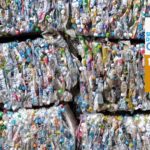What is BBVA doing to ensure sustainable consumption and production patterns?
United Nations Sustainable Development Goal (SDG) 12 entails using resources and energy efficiently, building infrastructure that doesn’t damage the environment, improving access to basic services and creating green jobs with fair pay and good labor conditions. BBVA helps to attain this SDG with sustainable action and initiatives designed to develop the economy and improve the quality of life life for everyone.

Companies play a fundamental role in achieving SDG 12, which includes sustainable consumption and production in all aspects of their work. The UN report: “Businesses and the United Nations. Working Together Towards the Sustainable Development Goals: A Framework for Action”, published in conjunction with Harvard's Kennedy School and Business Fights Poverty, stresses the importance of companies in this field. The report is an interesting guide for partnership design, co-creation, the combination of complementary skills and the development of solutions that harness the full potential that business can contribute to development.
100% renewable energy
For BBVA, this potential translates into a variety of initiatives and actions designed to foster sustainable consumption and production. In its Pledge 2025, the bank commits to manage environmental and social resources and minimize the potential negative impact - direct or indirect. The challenge is for 70 percent of the energy the Group uses to come from renewable sources by 2025 and 100 percent by 2030. In 2018, BBVA reinforced this commitment by joining RE100, a collaborative initiative among the most influential companies in the world that commit to use 100 percent renewable energy by 2050.
The Group is on track to achieve these goals. 100 percent of the energy used by BBVA in Spain comes from renewable sources with Certificates of Origin that verify this. This was one of the measures included in the Global Eco-efficiency Plan 2016-2020, which established that 48 percent of the energy used by the Group was to come from renewable sources. This milestone is also a reality in Paraguay, where energy generation comes from renewable sources. In Mexico, the bank signed a Power Purchase Agreement (PPA) or 15 year supply agreement with the Enel Group, through its Mexican subsidiary Enel Green Power Mexico. This agreement has made it possible for the electricity used by its main headquarters and network of branches to come from a wind farm built for this purpose.
Environmentally friendly infrastructure
The construction of infrastructure that does not damage the environment is a priority for the bank. BBVA City is a good example where engineers have developed several algorithms that combine the information gathered by over 50,000 sensores in the complex with other external data to get an energy savings equivalent to the annual consumption of 200 homes. This initiative is just one of the 102 savings measures implemented at BBVA City in order to reduce energy consumption by 12 to 15 percent since 2015.

102 savings measures have been implemented In the BBVA city to achieve a reduction in energy consumption.
Partnerships to end poverty
For years now, BBVA has been working to reduce inequality, improve access to basic services and help millions of people in the world escape poverty and exclusion through productive microfinance. In order to promote this, the BBVA Microfinance Foundation has been part of the SDG Fund (SDG-F) Private Sector Advisory Group since it was established in April 2015. Participating companies are helping the SDG Fund build a road map that explains in detail how public-private partnerships can help provide large-scale solutions to achieve sustainability in terms of production and consumption, in addition to the other goals laid out in the SDGs.
Action to raise awareness
In addition to specific initiatives, BBVA also takes action to raise awareness in society, things that have now become a tradition.
The last Saturday of March every year, the Group turns off the light at its headquarters for one hour in Spain, BBVA City, Mexico, the U.S., Colombia, Peru, Uruguay and Argentina to participate in “Earth Hour”, a WWF initiative. Earth Hour aims to raise awareness in society about the need to adopt measures to fight against climate change, save energy and reduce light pollution. This effort to raise awareness also takes place through the responsible consumption content BBVA publishes on its website. Designed for the general public, the website content covers everyday topics such as responsible credit card use and smart consumption habits, combining them with financial education advice.
A universal commitment
Pledge 25 is part of BBVA’s efforts to contribute to the Sustainable Development Goals (SDGs). The UN SDGs are a universal call to action to end poverty, protect the planet and ensure that all people enjoy peace and prosperity. The 17 goals include new fields like climate change, economic inequality, innovation, sustainable consumption and peace and justice, among other priorities. Thanks to its broad range of businesses – including the BBVA Microfinance Foundation – and its global footprint, the BBVA Group contributes to all these goals.